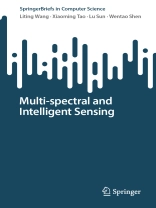This book provides a concise overview of intelligent technologies for vision and sensing, with a particular focus on their applications in various multispectral configurations, including safety monitoring in rural areas. Within the realm of intelligent perception and contemporary healthcare, the book emphasizes the real-time monitoring, analysis, and prediction of vital signals using biomedical optical sensors. This approach aims to offer more adaptable and personalized services within the medical health management domain. Furthermore, the book delves into the comprehensive comprehension of physiological signals and additional data sources, such as environmental and motion data. The goal is to enhance the breadth and depth of data analysis, providing more integrated support for the life and health sector. Additionally, the book explores the implementation of edge intelligence algorithms at the sensor level to enable real-time analysis, enhancing the efficiency of sensor data processing and utilization. Detailed explanations of the configuration and deployment of an active vision camera system featuring an integrated edge algorithm are provided to elucidate the coordination and communication mechanisms of edge intelligence technology across multiple edge devices. A specific application case is then presented—the universal camera jamming system—which underscores the benefits of intelligent sensing fusion for tasks such as attitude and position recognition, as well as self-feedback excitation jamming.
The book underscores the pervasive and seamless integration of smart sensing in both current and future lifestyles, spanning from active vision cameras to diverse applications across multiple spectrums. Its insights are poised to stimulate innovation and application within the realms of smart vision and sensing, including a comprehensive analysis of future healthcare paradigms.
สารบัญ
Multi-spectral sensors in multi-field applications.- Active visual camera system.- Universal camera jammer system.- Biomedical optical sensors.- Healthcare– Perfect realization of intelligent optical sensors.
เกี่ยวกับผู้แต่ง
Liting Wang, Ph.D., is an assistant researcher in the Department of Electrical Engineering, at Tsinghua University. She has a long interdisciplinary research experience in the fields of artificial intelligence, edge computing, and biomedical engineering. In recent years, she has been deeply engaged in edge intelligent computing and formed an active recognition intelligent camera system that can be applied.
Xiaoming Tao, Ph.D., is a professor in the Department of Electronic Engineering, at Tsinghua University. Prof. Tao served as a workshop general co-chair for IEEE INFOCOM 2015 and the volunteer leadership for IEEE ICIP 2017. She is serving as the editor of IEEE Transactions on Wireless Communications, Journal of Communications and Information Networks and China Communications. Her research interests include computational communications, multimedia wireless communications, semantic communications, and Qo E-based video quality measurement.
Lu Sun received her bachelor’s degree from the School of Mathematical Sciences, Zhejiang University, Hangzhou, China, in 2020. She is currently pursuing the Ph.D. degree in the Department of Mathematical Sciences at Tsinghua University, Beijing, China. Her research interests include interdisciplinary applications, applied mathematics, biomedical engineering, and signal processing.
Wentao Shen received his Ph.D. degree from the School of Astronautics, Beihang University, Beijing, China, in 2012. He worked as a postdoctoral researcher and now as an engineer in the Department of Electronics at Tsinghua University, conducting research on topics such as face recognition and biometric identification. His research interests include pattern recognition, signal processing of biological features, and intelligent healthcare.












